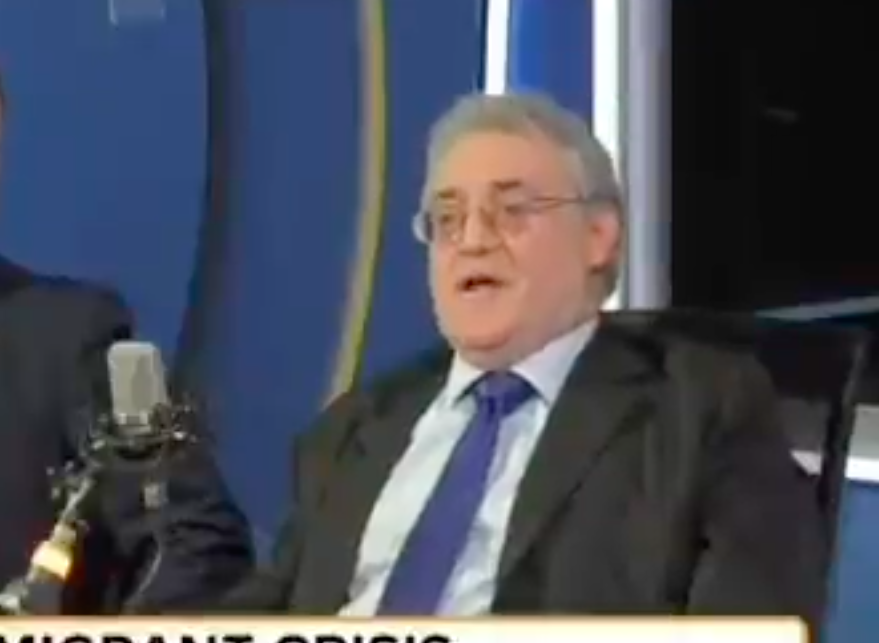Board of Deputies President Phil Rosenberg has told representatives of the United Synagogue that those who signed a letter published by the FT criticising Israel’s resumption of the war in Gaza “speak for themselves and not our organisation.”
Addressing 90 representatives of the UK’s biggest Orthodox body, Rosenberg also appeared to suggest he was considering taking action against the 36 Board members who signed the letter that sparked a bitter communal row after it was published last Wednesday.
Faced with calls from some present at the meeting for “disciplinary measures” to be taken against the signatories Rosenberg aslo appeared to suggest the Board was launching an investigation into those who signed the letter and would be looking to punish them for breaches of the communal organisation’s code.
The Board President had held an online meeting with US representatives, who included rabbis and shul representatives, last Thursday.
36 Board memners write letter to FT opposing war in Gaza
Many expressed outrage that a letter deeply critical of the Gaza war had been published by the influential newspaper, and had inevitably been interpreted by some outside of the community as the stance of the communal organisation.
In statements put out after the letter gained widespread publicity in the national media, in this country, and in Israel, the Board had stressed that the 36 signatories represented just 10 percent of all elected deputies.
The Board also insisted there was “unity” and “communal consensus” over the position on Israel 18 months after the October 7 Hamas attacks and a deadly war in Gaza.
It also emerged that the letter’s signatories were unsurprisingly members of Liberal, Reform or Masorti synagogues.
But Jewish News understands that at least 30 other members of the Board were ready to sign a letter published by the FT, but eventually decided against doing so because they could not speak for all those they were elected to represent.
Several deputies also expressed further anger at a post on X made by the Board President following a meeting with Israeli foreign minister Gideon Sa’ar last week, as the row over the letter simmered.
Rosenberg was pictured alongside Sa’ar in the April 17 post and was openly supportive of the Israeli government in a message that included the words:”Unity is strength. Division only serves our enemies.”
“Of course, our president should be meeting senior Israeli politicians,” said one deputy. “But to openly position himself as being supportive of the Netanyahu government. Is that really where most Jews in this country are right now?”
But last Thursday’s meeting with the US also illustrated the strength of the opposing view, held by many in the community, as senior shul representatives demanded Rosenberg get tough with those signing the letter.
“Phil made it clear the letter was not written in the name of the Board of Deputies and that they are exploring measures to send a message that nobody can speak in the name of the Board other than its official leadership,” the US said in a statement following the heated meeting.
“We look forward to continuing the dialogue.”
But Jewish News has spoken with other deputies who privately express support for those who “bravely” signed the FT letter. Several say the row over the communal body’s stance on Israel has been simmering for months now.
Since he was elected president last May, Rosenberg has joined leaders of the other main communal organisations in adopting a position that is firmly supportive of the state of Israel at a time of war and crisis in the aftermath of the October 7 attacks.
They argue that regardless of individual views of the government of Benjamin Netanyahu, now is not the time for diaspora Jewry to be involving itself in such matters.
Criticising the FT letter writers in an op-ed for Jewish News, Rosenberg wrote: “Whether intentionally or otherwise, the impression that has now been put forward by certain national and international news outlets is that yesterday’s letter published in the Financial Times, signed by approximately ten percent of Deputies, is the position of the Board of Deputies as an organisation, and therefore the position of the UK Jewish community as a whole.
“This is emphatically not the case, and as president of the Board of Deputies of British Jews, I speak for the organisation as a whole.”
He said the signatories “are now experiencing what I and other senior Board representatives know all too well; that it is remarkably easy to get the media to listen to you in this country if you highlight your Jewish identity while vocally criticising Israel or its government”.
In am op-ed for the Jewish Chronicle, Michael Wegier, the Baord’s chief executive added:”Regretfully, this week, one group of Deputies aired their views in a national publication, specifically in their capacity as Deputies, leading them to an incorrect assumption by a significant number of people in our community and beyond, that this group is putting forward the Board’s official position, which it is not.
“Taking the legitimate and often painful debate within our community to the letters pages of national newspapers, and sowing confusion about the position of the community as a whole, is a short-sighted and dangerous precedent.”

Marie van der Zyl and Michael Wegier at Limmud 2023
But 18 months after a war that has sparked widespread anger and questions about Israel’s conduct, and has left 59 hostages still in the hands of Hamas terrorists in Gaza, Jewish News spoke with deputies who, despite not signing last week’s letter, remain critical of both the continued conflict and the stance of the communal organisation.
“I was personally very supportive of the letter’s message,” one deputy told Jewish News, on the condition that they remain anonymous. “I know of at least 30 other deputies who also backed the general message of that letter.
“As the elected representative of my shul, hardly a day goes by when I am not contacted by someone wanting to express a view about the war in Gaza.
“In the past few months, these phone calls and messages have increasingly been from people concerned, angry or just saddened that the conflict continues.
“But there are still those voices who stick with the position held by some of our communal leaders, who say we must always stand with Israel in a war sparked by the October 7 Hamas attacks.
“For this reason I didn’t feel able to put my name to the letter, even if I personally supported it.”
Another deputy, again speaking anonymously, said that as an elected representative of a communal organisation by putting their name to the letter they might falsely give the impression that the entire body had supported it.
“Some would happily support what it was saying – but others most certainly don’t,” they reasoned.
“I just thought I need to stay out of this, even if I wish the leadership of the Board didn’t give the impression we all speak with the same voice when it comes to Israel.”
Jewish News understands that at least one elected deputy is now planning to quit in protest at the way the Board has handled the letter row.
The argument has also been seized upon by those on the right of the community of evidence that the Board holds a position that is now unsupportive of Israel over Gaza.
Gary Mond, chair of the National Jewish Assembly, said:”I would take a bet that if a secret ballot was held at the Board the views of the 36 would be in the majority.”

NJA’s Gary Mond appears on Talk TV
Meanwhile, on the Whatsapp message groups run by some grassroots activists, the 36 letter signatories have been subjected to ugly slurs including the taunt that they are “kapos.”
But there are also voices from the centre of the community now calling for the Board president to openly reach out to the “significant” number of deputies unhappy with his stance on Israel, which is seen as failing to recognise the unease many British Jews have with the continued war in Gaza.
“Phil ought to be asking why deputies feel so poorly represented that they are forced to write a letter to the FT,” one senior communal source reasoned.
“Some might argue the community needs better representation at the complex and challenging time.”
Another deputy sent an email stating: “Must we remind the Board that only 12 percent of British Jews express approval for Netanyahu ? We remain convinced the Board’s leadership does not speak for our community.”